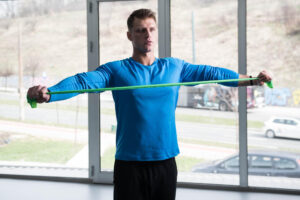If you’re just starting your fitness journey, you’ve landed in the right place. In this post, you will discover essential beginner-friendly tips that will help you transform your fitness goals into reality.
Set realistic goals
One common mistake many beginners make is setting unrealistic goals. While it’s great to have big aspirations, it’s important to be realistic about what you can achieve in a given timeframe. Setting unattainable goals can lead to frustration and disappointment, which can ultimately derail your progress.
Instead, start by setting small, achievable goals that you can work towards on a daily or weekly basis. For example, instead of aiming to lose 20 pounds in a month, set a goal to lose 1-2 pounds per week. This is a more realistic and sustainable target that you can actually achieve.
Setting realistic goals also allows you to track your progress more effectively. When you set smaller goals, you can easily see the progress you’re making and adjust your approach if necessary. This helps to keep you motivated and focused on your fitness journey.
Remember, fitness is a journey, not a destination. It’s important to celebrate the small victories along the way and not get discouraged if you don’t reach your goals as quickly as you hoped. Stay committed, be patient with yourself, and keep pushing forward.
Create a balanced routine
A balanced routine should include a combination of cardiovascular exercise, strength training, and flexibility work.
Cardiovascular exercise, such as jogging, cycling, or swimming, is essential for improving your heart health and burning calories. Aim for at least 150 minutes of moderate-intensity cardio each week, or 75 minutes of vigorous-intensity cardio if you’re up for a challenge.
Strength training is another important component of a balanced fitness routine. It helps to build lean muscle mass, boost your metabolism, and improve overall strength and endurance. Incorporate strength training exercises at least two to three times a week, targeting all major muscle groups. Don’t be intimidated by weights; bodyweight exercises or resistance bands can be just as effective for beginners.
Flexibility work is often overlooked but is crucial for injury prevention and improving range of motion. Include stretching exercises or activities like yoga in your routine to enhance flexibility and promote relaxation.
Start slowly
One of the biggest mistakes beginners make is pushing themselves too hard too soon. This can lead to muscle soreness, fatigue, and even injuries that can set you back in your progress. Instead, start with low-impact exercises and gradually increase the intensity and duration as your body adapts and becomes stronger.
Begin by incorporating gentle activities like walking, swimming, or cycling into your routine. These exercises are low-impact and help to build a solid foundation of cardiovascular fitness. Start with shorter durations and gradually increase the time as your endurance improves.
When it comes to strength training, start with light weights or bodyweight exercises. Focus on mastering proper form and technique before increasing the resistance. This will help prevent injuries and ensure that you’re targeting the right muscles effectively.
Rest and recover
Many people believe that working out every day will yield the best results, but in reality, giving your body time to rest and recover is just as important as the exercise itself.
During exercise, your muscles undergo stress and micro-tears occur. It is during the rest and recovery period that your body repairs and rebuilds these muscles, making them stronger and more resilient. Without adequate rest, you may be at a higher risk of injury and your progress may plateau.
One way to incorporate rest and recovery into your fitness routine is by scheduling regular rest days. These are days when you intentionally take a break from intense exercise and allow your body to recover.
In addition to rest days, it’s important to prioritize sleep. Sleep is when your body goes into repair mode, and it plays a crucial role in muscle recovery and overall well-being. Aim for 7-9 hours of quality sleep each night to optimize your recovery process.
Listen to your body
One of the most important ways to listen to your body is by being aware of how you feel during and after exercise. It’s normal to experience some muscle soreness and fatigue, especially when starting a new fitness routine. However, if you feel sharp pain or discomfort during exercise, it’s a sign that something may be wrong. Pushing through pain can lead to injury, so it’s important to stop and assess the situation if you experience any unusual or intense pain.
Additionally, pay attention to your energy levels. If you feel excessively fatigued or lethargic, it may be a sign that you need to take a break or adjust your workout intensity. Pushing yourself too hard when your body is telling you to rest can lead to burnout and hinder your progress.
Track your progress
One of the simplest ways to track your progress is by keeping a workout journal or using a fitness-tracking app. Record details such as the exercises you performed, the number of repetitions or sets, the weight lifted, and the duration of your workouts. This will help you track your progress over time and identify areas where you can challenge yourself further.
Another important aspect of tracking progress is taking measurements and keeping track of your body composition. This can include measurements of your waist, hips, arms, and thighs, as well as recording your body weight and body fat percentage. While the scale alone doesn’t provide the full picture, tracking these measurements can help you see changes in your body composition and overall progress.
In addition to physical measurements, it’s also helpful to track your performance and endurance. For example, if you’re a runner, you can track your running distance, pace, and time. If you’re strength training, you can track the amount of weight you’re able to lift for each exercise. Seeing improvements in these areas can be incredibly motivating and encourage you to keep pushing yourself.
Progress photos can be another powerful way to track your transformation. Take photos of yourself at regular intervals, such as every four to six weeks, to visually see the changes in your body. Sometimes, the scale may not reflect your progress accurately, but progress photos can provide a visual representation of your hard work and dedication.
Find activities you enjoy
The options for physical activities are vast, so don’t be afraid to explore and try different things to find what resonates with you. Consider your interests, preferences, and what brings you joy. Here are a few ideas to get you started:
- Group fitness classes: Joining a group fitness class can be a great way to stay motivated and have fun while working out.
- Outdoor activities: Take advantage of Fayetteville’s beautiful natural surroundings by engaging in outdoor activities. Go for a hike or trail run at a local park, try kayaking on the Cape Fear River, or go for a bike ride on one of the city’s scenic trails.
- Sports and recreation: Consider joining a local sports league or recreational team. Whether it’s basketball, soccer, tennis, or any other sport, playing with others can be both physically and socially rewarding. It’s a great way to stay active while having fun and building connections with like-minded individuals.
- Home workouts: If you prefer the convenience of working out at home, there are plenty of online workout platforms and apps that offer a wide range of workouts you can do from the comfort of your own space. From bodyweight exercises to yoga sessions, you can find something that suits your interests and fitness level.
Remember, the key is to find activities that you genuinely enjoy and look forward to. Don’t be afraid to try new things and step out of your comfort zone. The more enjoyable the activity, the more likely you’ll stick with it and make fitness a sustainable part of your lifestyle. If your unsure what you’d enjoy but focus is on the effectiveness of an exercise regimen, here’s the efficacy comparison between bodybuilding and calisthenics.
Stay active outside the gym
Staying active outside the gym is just as important as your workouts when you’re a beginner. While the gym provides a structured environment for exercise, there are plenty of opportunities to stay active and burn calories outside of those walls. Here are some ideas to help you stay active in your daily life:
- Walk or bike: Instead of driving for short distances, consider walking or biking whenever possible.
- Take the stairs: Opt for the stairs instead of elevators or escalators whenever you have the chance. Climbing stairs is a simple and effective way to get your heart rate up and engage your leg muscles.
- Active hobbies: Engage in hobbies or activities that require physical movement. This could include gardening, playing with your kids or pets, dancing, or even doing household chores.
Get a personal trainer
One of the best decisions you can make as a beginner in Fayetteville is to hire a personal trainer. While it may seem like an added expense, the benefits far outweigh the cost.
A personal trainer will not only provide you with the guidance and expertise you need to kickstart your fitness journey, but they will also keep you motivated and accountable along the way.
No matter if you are just starting your fitness journey or you are ready to get personal assistance, make sure to claim your 3-day free pass at HiTone Fitness Fayetteville and enjoy beginner-friendly workouts and environment.







